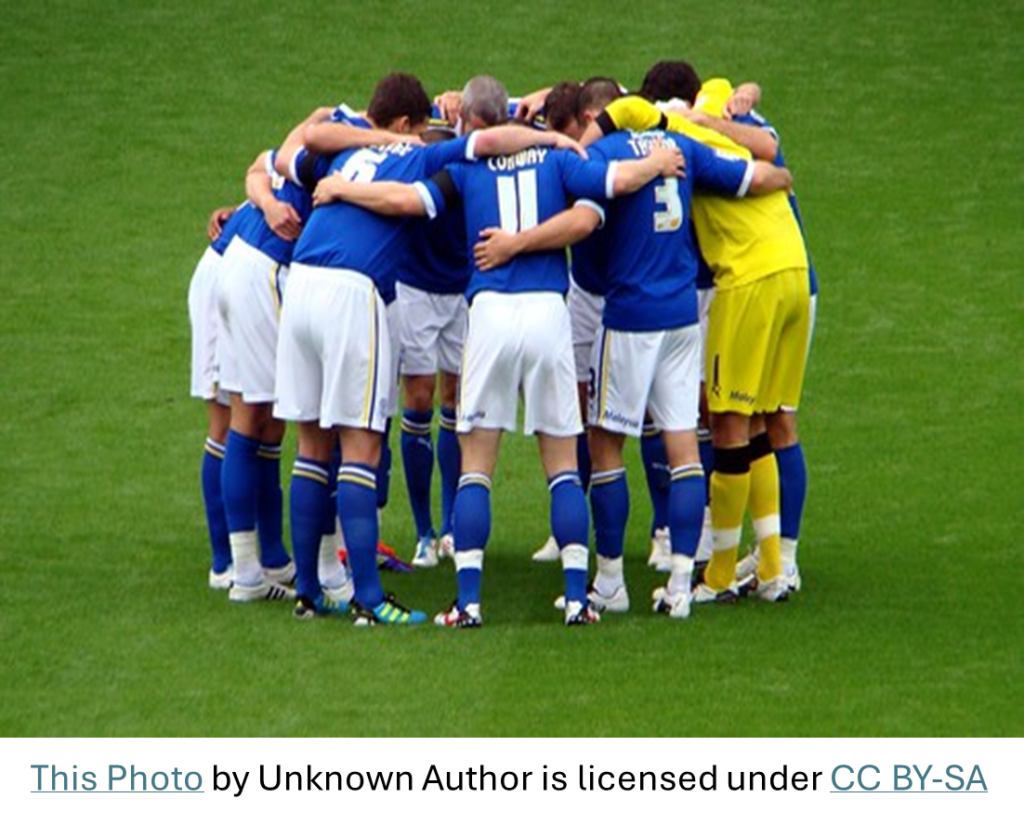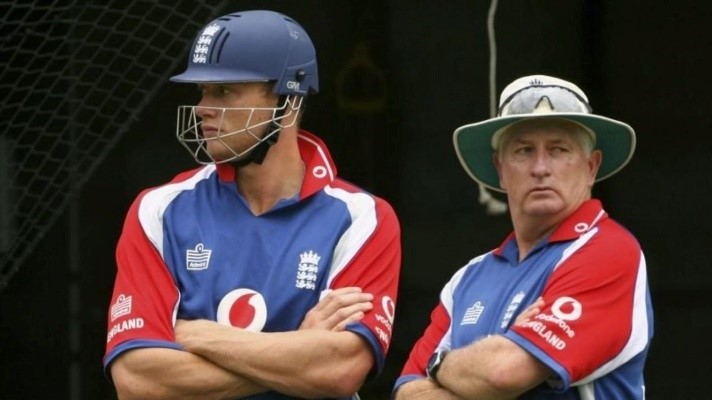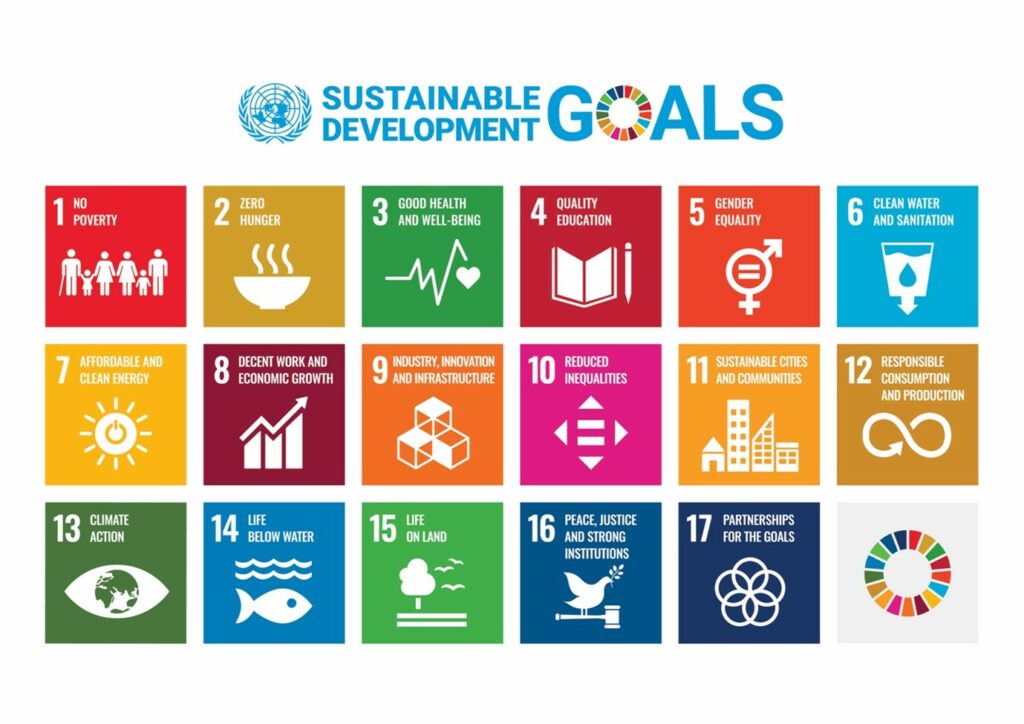
With the start of the 24/25 football season and end of the cricket season, now is a great time to consider how teams work together. Drawing on insights from Social Psychology and Sports Psychology, Matt Spokes, Lecturer in Psychology, reveals some of the reasons why our favourite teams may underperform, so that next time you are watching your team play on the pitch (or maybe as an armchair critic!) you can understand why.
What makes a team work well?
Whether a team works well together or not depends on something called ‘Team cohesion’ – that is, how well a group sticks together to be united in the pursuit of the team’s objectives whilst also maintaining the satisfaction of team members’ emotional needs (Carron et al., 1998). Team cohesion depends on the bonds and relationships between group members – in other words, how much team members like each other (Bernthal & Insko, 1993) -but also the team’s commitment to attaining goals, e.g. winning games (Bernthal & Insko, 1993). Team members will weigh up how they feel about the task in front of them, as well as the desire to do well for the team. So how can we bring a team together, even if they don’t like each other?
Team Goals
Team goal setting can be one method used by sport psychologists to help build cohesion in a team as it can lead to improved team focus (Widmeyer & Ducharme, 1997). Athletes have suggested that team goal setting is a good way of building cohesion (Stevens & Bloom, 2003).
To set team goals, the team consider a range of different options (more shots on targets, more runs saved in the field, higher turnover %). Team members then individually select the most important goals, before discussing ideas and agreeing on collated goals (Senecal, Loughead & Bloom, 2008). Teams are encouraged to review and check that these goals are appropriate at certain time points e.g., during structured breaks in the season, or if they need re-structuring due to over or under performance.
Knowing what is required of you as a team member

If the team has set goals collectively, it is important that each member is also aware of how they can help achieve these. To create an effective team, team members should know what is required of them and how to achieve this (‘role clarity’). When team members have a lack of clear information to be able to perform actions for a certain position or role, this leads to ambiguity and can contribute to poorer team performance. Historically this can be linked to Kahn et al., (1964) who suggested there are three subtypes of task ambiguity. Firstly, scope of responsibility (athlete knows clearly what the expectations are), secondly, behavioural responsibilities (athlete knows what actions/skills will lead to achieving these expectations), and finally hierarchy of responsibilities (athlete knows what the priorities are to fulfil multiple expectations (Eys & Carron, 2001). This will look different dependent on the sport, for example it could be around the level of aggressiveness they play with, who they have to mark in a game, at what point they bowl in a match.
In contrast, role ambiguity can be down to a lack of information and messaging from key figures like coaches, or it could be the individual who may not understand or may have a different perception (Eys & Carron, 2001). Individuals that are unclear about their responsibility/role hold a lower viewpoint of the team’s task cohesiveness. The understanding of their role is key because it dissipates across a team and influences cohesion. If an athlete is not sure of what they need to do they will likely believe that their team mates also feel the same and as a result see the team lacking cohesiveness (Eys & Carron, 2001).
Social cohesion – for better or worse?

Social cohesion helps shape values of the group which can be linked to success. If a group values productivity the team members will have an expectation and social norm that is working to achieve the aims, so individuals are not only putting effort in for themselves but also the team (Langfred, 1998).
Social cohesion is not always good if it reinforces and perpetuates negative behaviours. There is also the risk that the social cohesion of a group can produce a lot of resistance which coaches may have a tough time trying to overcome with potential power struggles and conflicts experienced because of this (Pescosolido, & Saavedra, 2012). One example during the Cricket World Cup was the Flintoff pedalo debacle and fallout with the coach Duncan Fletcher.
Sometimes the culture may never be challenged, the group may stagnate and the ability to act with freedom and creativity to achieve the team goal is not always considered a priority (Hackman, 1992). The focus is instead on the social aspects and relationships within the team rather than the performance and team goals.
What happens when some players stop putting in effort whilst others continue to achieve the team goal?
The reduction in motivation and effort when individuals work collectively, compared to when they work individually, is described as ‘social loafing’ (Høigaard, Tofteland, Ommundsen, 2006).
Mulvey and Klein (1998) have suggested that perceived social loafing is where an athlete will make judgements about their teammates effort. This perception can be true and therefore justified, or false, either way it still brings around the same effect. The motivation and effort will drop and this impacts how good a team is because less effort is likely to mean worse performance. This perception of loafing may be due to the change in relationships and dynamics of the team.
If members think that others are loafing, they will likely respond by reducing effort themselves as they don’t want to be seen as being played/used by others. They’ll aim to match the level they believe others are operating at (Høigaard, Tofteland, Ommundsen, 2006).
If a team holds a performance culture or social norms which are centred on effort, i.e., working hard but also trying to perform to a high standard, this can be guard against social loafing. Task and social cohesion mentioned earlier are of great importance in protecting against social loafing. Social support elements of the team can help foster this further by providing feedback and reinforcement to one another (Høigaard, Tofteland, Ommundsen, 2006).
Putting the research into practice: What can coaches do to help teams?
Building clear communication, trust and understanding of team-mates will help build cohesion (Pescosolido, & Saavedra, 2012).
Being aware of the skills, emotions, preferences and typical responses of teammates is important. Knowing who might work well under pressure, what skills they can bring and execute in a competition all add to the performance of a team. According to Thompson 2012, there are 5 things coaches could work on to improve their teams:
1. Help the team players develop a collective identity, and focus on having clear roles. As a coach, you can learn what skill sets your players have, and start to discuss with them how you can see them using these skills in certain areas of the game.
2. Make it easier for team members to be close and build relationships (e.g., host team socials)
3. Focus on similarities among team members to bring them together
4. Highlight the positives of the team’s performance even during times of difficulty (coaches can do this by using half time breaks in play/drink breaks, to reinforce this)
5. Challenge the team, motivate them with goals that stretch them to work together
If you don’t coach, but you play sport like I do, then try your best to apply these in a slightly different way. Can you take an active role by trying to bring the team together through team socials across a season e.g. festive celebrations. Try and motivate your team-mates by highlighting positive performances during drinks breaks or at the end of a match.

Matt Spokes
Matt Spokes is a Lecturer in Psychology at the University of Worcester. He is interested in sports performance under pressure, and supporting athletes through injury, and is a
member of the Interpersonal Relationships and Wellbeing Research Group.



